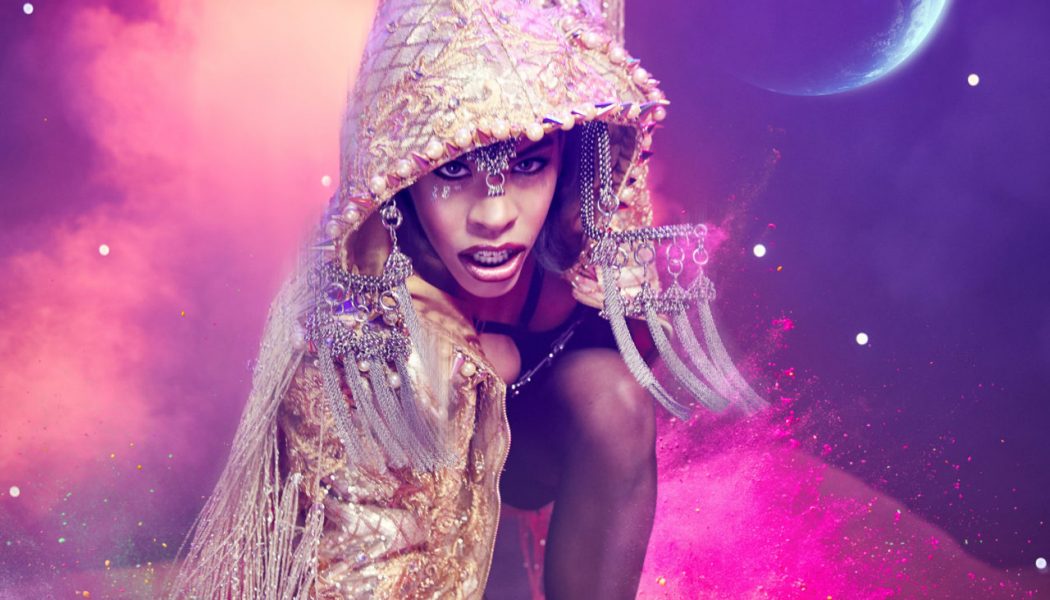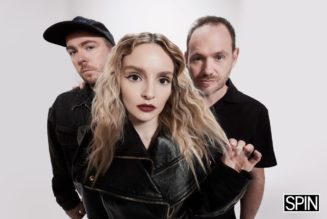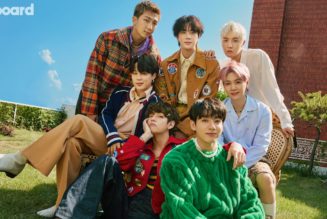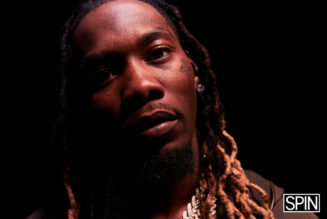After years of watching pop stars like Lady Gaga, Nicki Minaj and Rihanna perform at MTV’s Video Music Awards, Rico Nasty yearned to dominate that very stage. But insecurities like appearing too shallow or not looking like a glamorous “bad bitch” made the rapper question if this was her rightful path.
“In my brain, there was always a timer where I just go back to regular life and look on this time like, ‘Girl, you did that,’” the 23-year-old explains over Zoom, settling into her new Virginia home. “Then this shit just started a snowball effect — it literally never stopped. I remember being like, ‘I’m really doing this.’”
Rico’s refusal to fit into female rap’s stereotype has separated her from her peers. It was always in her blood, though: Her father was a rapper, and while he didn’t directly teach her, his musical DNA was inherently passed down to her. Rico’s talents were solidified with her first mixtape, 2014’s Summer’s Eve. Highlight track “Fuck 420” caught the attention of the rapper’s future manager and boyfriend Malik Foxx after he peeped the mixtape link in her Twitter bio.
“I DMed her and asked if she still rapped,” he tells SPIN about first meeting Rico. “The conversation went from there, and we literally got on FaceTime a couple of days after that. Since then, I’ve been talking to her every single day.
Pre-quarantine and pre-fame, Rico thought healthcare was her calling, researching lobotomy and RN studies at her receptionist desk. But the long, tedious days soon caught up to her. Rico passed the time by scrolling on her phone through Vine (which she credits for igniting her virality) and Twitter — an activity that became too frequent for her boss: She was fired after only six months.
It ended up working in her favor, though. Rico used her final hospital paycheck to fund 2016’s “iCarly” video (yes, based on the popular Nickelodeon teen show). “I remember [my son Cameron] was like six months [at the time] because he started getting his teeth,” she recalls. “My dad had to watch him for the video shoot because once I lost my job, my mom was beefing with me.”
Rico had Cameron at age 18 following high school graduation. His father Brandon didn’t get a chance to meet him, after dying of an asthma attack just months earlier. She confirms this was a major source of her depression.
“I also felt like nobody was ever going to tell me no,” she reveals. “Like, it was fun at first when there’s little shit you’re enjoying the perks of. I want to talk about this because I want people to understand what the shit felt like because it turns from pure, innocent fun to evil. You start using your power in the wrong areas.”
This life-altering loss, unfortunately, intersected with Rico’s burgeoning success. The combination of a viral video (“iCarly” has since garnered 3.5 million YouTube views) and support from then-burgeoning Lil Yachty (he invited her onstage at a local show, hopped on her “Hey Arnold” remix and added her to 2017’s Fate of the Furious soundtrack cut “Mamacita”) wasn’t enough. Rico still had to nurture an infant Cameron while hustling to eat. Foxx worked long closing shifts from 1 pm to 10 pm at the dollar store and could only help babysit Cameron on the weekends.
“I was stocking snacks all day and getting fat. Just horrible,” Foxx recalls while chuckling. “And she didn’t like her job at all. We’re fresh out of high school and literally working just to get some type of money. All she used to do was complain about not making enough. We’re all making like $300-$350 a week. What am I doing with this?”
After months of spending EBT checks on Similac formula for Cameron and groceries for themselves, the couple was getting frustrated and wanted to find a gig where they could make their own hours.
“Rico was like, ‘Why don’t you just engineer?’” Foxx says. “Because I used to watch YouTube videos on how to mix music. So we just did that.” He built a soundproof wall in a room in his basement and began charging local rapper friends $20 per hourly session.
“I knew I wasn’t the best engineer, but these weren’t the best artists. The money’s better, but it was a waste of time,” Foxx continues. “I [told her], ‘You can record and we could charge for some features.’ Literally after that, she’s been killing it every time we go in the studio. It no longer felt like a waste of time.”
Rico has come a long way from being a hospital receptionist following high school graduation, a job she realizes is now darkly ironic given the immeasurable amount of healthcare workers on the pandemic frontlines. Coincidentally enough, one of her aunts still works in the field. “It definitely puts shit in perspective,” Rico says. “I’d be scared as shit to go to work.”
Following “iCarly,” Rico has released six mixtapes that introduced fans to various characters inside her brain: 2016’s Sugar Trap and its sequel are cutesy bubble-gum trap-pop; 2017’s Tales of Tacobella shows her emotional and vulnerable side; and 2018’s Nasty and 2019’s Anger Management (both of which feature production from frequent collaborator Kenny Beats) forcibly bring out the rage in one of the planet’s most timid people.
“It was always important for me to do that with personas because early on, one thing that people have always done was compare me to whatever rapper was hot at the time,” she explains. “When I first came out, I sounded like Yachty. Then it was [Lil Uzi Vert], then once Christmas came around it was Cardi B.” She then proceeds to yell in that signature raspy voice: “I SOUND LIKE MYSELF, GODDAMNIT!”
Comparing Rico Nasty to anyone else is just lazy. Her flows — which range from underground Fight Club member spitting through gritted teeth to helium-filled squeaks that resemble Rugrats’ Angelica Pickles if she ever broke out of juvenile detention — could only come from her.
With the guttural intensity sprinting through Nightmare Vacation, her major-label debut, I actually believe Rico can beat someone up. The album channels her rage, from the shit-talking “Candy” to the taunting “STFU.” But similar to Julie Andrews’ lead character in The Sound of Music, I’m on a quest to understand Maria, Rico’s given name — the person behind the personas.
When I commend her on being unpredictable, she claims she’s blushing. The only thing is, her Zoom screen remains blank. When I assure her this is a judgment-free zone, we giggle while realizing we’re both donning our coils in similar updos and sigh over the struggles of maintaining healthy natural hair. Here, bare-faced and glowing, without the armor of spiked clothing or cotton candy-colored wigs, Rico allows me to enter a more intimate space. This is when we embark on a virtual journey back to her childhood.
Born Maria-Cecilia Simone Kelly in Largo, Maryland to a Puerto Rican mother and Black father, Rico was raised in Prince George’s County and later moved to Palmer Park with her mother. Despite being an only child, she never felt weird until her mom enrolled her in boarding school in sixth grade to further her education. There, an overbearing shadow of loneliness was cast.
A majority of her classmates were from Baltimore. Despite living on the outskirts of P.G. County (one of the country’s wealthiest Black-majority neighborhoods), they still looked at Rico as a “bitch.” “I remember this specific time I was friends with these girls, and they were all named Jordan — they were all spelled differently and were cool as shit.”
She laughs as I point out the Ashleys clique from Recess before recalling a painful time in school:
“My birthday weekend rolled around, and me being so pressed to have friends, I invited these girls over to my house. One of the Jordans was from Baltimore, and then the other two were from P.G. County. They were just being rude as fuck. I ain’t never in my life had somebody come to my house and be disrespectful to my mother.”
Rico grimaces as she revisits the bullies laying dormant in her memory.
“The weekend was horrible in itself. But when we got back to school, they was making fun of my house and my room being small, and the fact that the clothes that I wore to school were [the only ones] had,” she continues. “I never even noticed that until they pointed that out. I literally had to go back to the dorm and sleep by myself. It’s so bad when kids be bullying other kids about their living situations because that’s not their fault. And it’s not even a parent’s fault because that’s all their parents can get.”
But the memories aren’t all bad.
Rico’s face lights up when I mention a Twitter thread that compares her style to Rihanna, one of her biggest inspirations. I’m also a major fan, and we become extra giddy, like two homegirls, upon realizing we both have Rihanna’s coffee table book sitting right in front of us. Naturally, we continue obsessing over her.
“First of all, I performed [Rihanna’s] ‘Umbrella’ in my school talent show,” she recalls. “My friends and I used to go to William Paca Elementary School and had to learn a dance routine with umbrellas. I’ll never forget that. That was like the first time I ever performed.”
The coincidence of Rihanna setting the tone for Rico’s stage debut to the rapper now being a Savage x Fenty ambassador isn’t lost on me. Last September, she walked as a model in their fashion show. Talk about a full-circle moment.
“Actually meeting her was was beyond full circle, girl,” she adds. “I felt like I already knew her. Feeling seen as important by the main person who I would just look up to so much … like my hair was red with bangs and everything [a nod to Rihanna’s 2010 Loud era].” Then, Rico jokingly lets me in on her one wish: having Nicki Minaj and Rihanna perform their “Fly” collaboration if anything happens to her.
“That song literally used to get me through life. [Minaj’s Pink Friday] reminds me of middle school,” she says. “I got on honor roll and I just remembered [begins rapping ‘Blazin’]: ‘How could it be, little me had the power to be the best B in the league?’ Everything about their shit shaped middle school and who I became as a girl. Cause you could be crazy like Nicki or sexy and mysterious like Rihanna.”
But when I ask her to define Maria, Rico grows unexpectedly solemn, pausing to think before responding: “I feel like me without makeup is Maria. I will say that makeup makes a bitch change. When I put it on, I be like [intones in a mockingly posh manner], ‘Don’t talk to me. Who are you?’ But there’s nothing that should make me feel like I’m better than nobody on God’s green earth, baby. Because if I haven’t found a cure to COVID, then I’m just like these other bitches. Artists shouldn’t be that separated from their real selves and whatever persona they feel.”
Last year was meant to be Rico’s mainstream coming-out party with the release of Nightmare Vacation. As with almost every other artist, the pandemic halted touring plans, causing Foxx to rethink their marketing strategy.
“I remember getting that call like, ‘Yo, I’m in L.A. and I’m starting to see people panic. I think all the shows are going to get pulled down,’” he recalls. “Hearing that was devastating because we had 30 shows locked in for about $600,000.”
But after years of hustling, being in quarantine forced the pair to slow down.
“Every time we talk to people, they like, ‘Bro, y’all be working way too hard. Y’all never get to enjoy the house. Y’all never get to enjoy family,’” he continues. “[Quarantine] gave us that peace of mind, that sanity. I think it’s still okay because we did so much of the groundwork, and the game plan was always to make sure that anything we do is marketable.”
And that’s exactly what happened. When Rico isn’t raising Cameron (who is now 5), feeding her new snake (the cheekily named Voldemort) or cheffing up seafood boils in the kitchen, she’s racking up multiple brand partnerships: an ambassador for Rihanna’s Savage x Fenty lingerie line, teaming with Il Makiage for an edgy makeup collection, channeling her punk side for a jewelry collaboration with NYC-based brand Chrishabana. Gone are the days of chasing the bag; the bags are readily landing at her feet. As we go through her successes of 2020, I couldn’t help but notice something coming out of the wall: “Wait, is that a stripper pole in the back?” Rico confirms with a naughty grin, revealing she’s been practicing since last August.
“Sometimes I’m like, ‘I don’t wanna be a rapper no more. I’m feeling the pole.’ And then as soon as I start getting sore, I’m like, ‘Actually, nevermind,’” she jokes, attributing her new quarantine hobby to discovering R&B singer Brent Fiyaz and watching HBO’s P-Valley with Foxx. “P-Valley made it seem like it was so easy. The shit strippers be doing is ridiculous. To swing your leg like that, bro. I feel like you could crush a n—a’s head with thighs that strong.”
If 2019’s Anger Management title introduced her rage, her debut album is letting it go buckwild. “Bitches throwin’ shade / Punch ‘em in they mouth,” Rico spits on Nightmare Vacation’s hellish “Let It Out,” produced by 100 Gecs.
The experimental hyperpop duo, comprised of Dylan Brady and Laura Les, first learned about the rapper around 2018. “My friend [and singer-songwriter] Lil Aaron was going to her pop-up show at some store on Melrose Ave [in Los Angeles],” Brady recalls. “I didn’t go but I saw videos and it looked insane. I was so sad to not be there. I looked her up after that and was like, ‘This music is crazy.’”
100 Gecs first worked with Rico on last July’s 1000 Gecs and the Tree of Clues remix album, where the rapper hopped on “Ringtone” alongside Charli XCX and Kero Kero Bonito. “I think she reached out to us before we even were thinking about a remix album,” Les says. “We were just gonna make like one or two [tracks]. Then when she got on board, it really finalized the project. She sent her stems really, really early. We were like, ‘Jesus, this is so good.’”
When they reunited for Nightmare Vacation, 100 Gecs helped Rico push beyond her comfort zone while bringing their inspirations like Skrillex and the late SOPHIE to the studio. “I’ve definitely been in sessions before where people are not interested in widening the sonic scope of their music, which is totally fine,” Brady says. “But with Rico, everything is on the table. She is not staying in one lane. She is swerving into everyone’s lane and killing it.”
The duo figured out the perfect balance of controlled chaos with Rico. The result? The confrontational “OHFR?”, the playful “Pussy Poppin” and “iPhone,” injected with enough pitch-shifting surrealism to make PC Music’s A.G. Cook smile. And then there’s “Let It Out,” which encapsulates decades of fury that exasperated Black women have all been waiting to release. “She wanted to do something a little bit harder, and we were working with a lot of guitars at the time,” Les recalls. “So we pulled up a guitar and just tried to mangle it as much as possible. [The song] was on the biggest array of speakers I’ve ever seen. It was nuts.”
The rapper, like nearly all women, has long-earned the right to be pissed off. “Don’t y’all hate when mfs say all lives matter … WELL THATS HOW IT FEELS WHEN WE TALKING ABOUT HOW FEMALES GET TREATED … and n—-s like well we get treated bad too .. NOOOOOO UR MISSING THE POINT,” Rico tweeted in January. I bring up Promising Young Woman, which follows the lead character avenging her best friend, a rape victim, by taking advantage of men in the same manner they do women. There are parallels between Rico’s music and how Promising Young Woman processes trauma.
“That’s why I make the music I do because I feel like it’s important that we get our power back and we don’t forget that we have that. Like, I could hurt you too. Don’t play that. Everybody on this earth can get what they deserve,” she explains. “But there’s also that fine line of wanting to be gentle, to be loved, to still be affectionate. But at the same time, the world ain’t that. People are evil. And it’d be the person closest to you to do something to you.”
It’s a problem that women face: being forced to show compassion at the hands of a white male-dominated society while fighting the urge to seek revenge without consequences. Rico seemingly relates to my explanation of these cyclical gender expectations, pensively nodding before responding: “As a woman, you’re supposed to keep a smile and stay poised throughout it. I think it was good they made that movie because bitches crack too. The worst part is when it’s other women that don’t understand, like what happened to her friend [in Promising Young Woman] and the girl was just like, ‘I mean, she was drunk.’ That is so weird to me. There’s so many girls who get raped and get humiliated. And it’s just like, ‘She shouldn’t have been drunk.’”
There are very few safe spaces for women, queer and non-binary people to escape. Rico’s music has become one of these sources. “It just always feels like there’s not a space for you where people are not going to be excessively rude because they’re homophobic or anti-women,” she says, agitation audibly growing in her tone. “Look at the Freemasons. All of these weird-ass cults that be only men. You have to have a penis.”
Rico is breaking boundaries by making her fans feel comfortable joining the mosh pit, fighting against men who use their strength as an advantage. “It’s like conditioning for us at the festivals,” she explains. “I always felt like if I teach them that we are powerful and that no one can stop us here, they can’t shut this down. When we go to [music festival] Rolling Loud or wherever, we’re always going to look the craziest always because that’s the bond we built behind closed doors.”
“Once Upon a Time,” the Tales of Tacobella opener, lays out exactly what she wants in life. When asked if her fairytale came true, she once again grows somber, revealing she plays the mixtape when she feels sad.
“Sometimes I get real sad and I’d be like, ‘Why didn’t I just blow up overnight? Bro, look at me. I know I’m talented. Come on,’” she explains. “When I first started blowing up, I probably would’ve killed myself like a lot of these rappers [who have died in recent years] because I was so lonely.”
As her fame grew, Rico relied on drugs since it was the only thing she was able to control at that time.
Her ever-growing fanbase made her realize she had to be present in the moment, knowing they deserve her full attention.
“These kids are depressed. I want to normalize being extremely sad for a couple of days and then being fine because that’s life. I’m not going to be OK every day,” she continues. “They force kids to think that these influencers just wake up like, ‘It’s a beautiful day!’ You can have all the money in the bank account or sign a great deal and [still] just feel empty. You feel how everybody else feels. I want to show people that you can be cool as fuck and still be empathetic.
“You’re gonna look back on pictures like, ‘I should have just went there!’ Everything you’re afraid to do in the moment, just do it and see what happens. I bet you feel good as shit like, ‘Damn, I did that!’”
Rico doesn’t like to witness wasted potential — including her own. Just like she did with her career, she wants her fans to push past fear.
She continues: “The way [my fans] would look at me, it’s just scary sometimes because I didn’t even know I was that to them. I was just a regular girl … I don’t want to just be a rapper who’s pretty and cool. I want to be everybody’s big sister.”
















